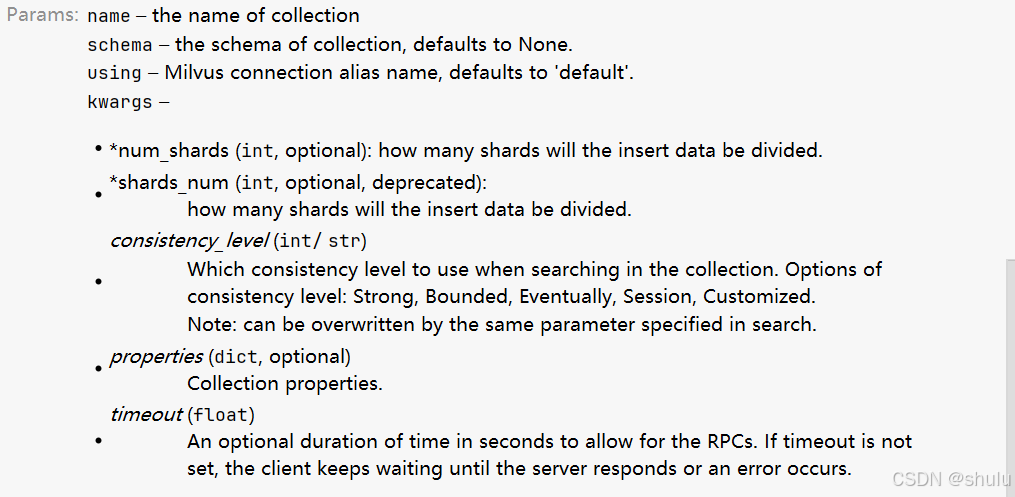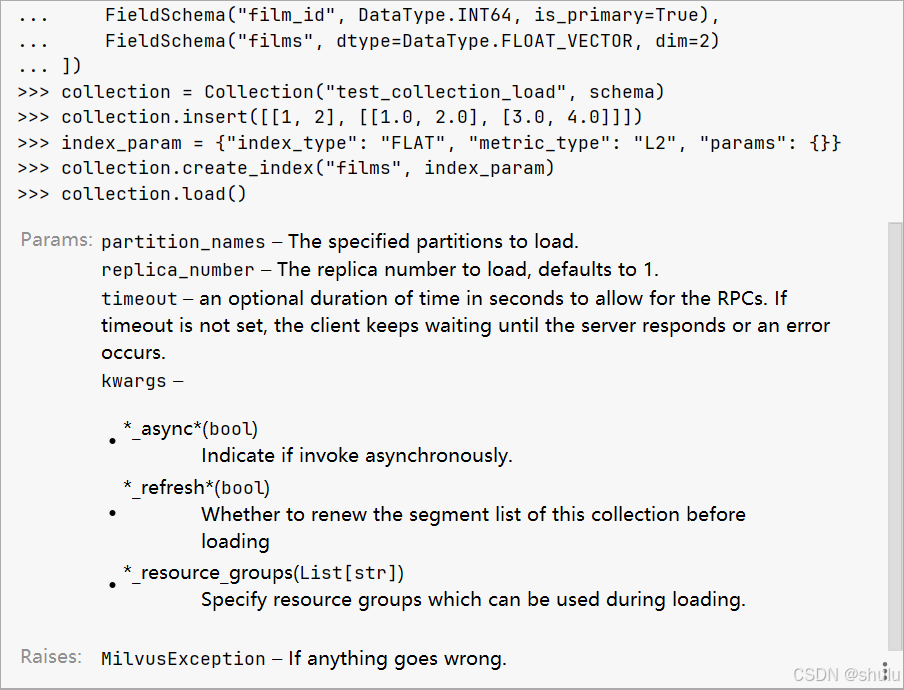milvus的collection操作
创始人
2024-12-28 03:10:05
0次
milvus的collection操作
创建collection
import uuid from pymilvus import ( connections, FieldSchema, CollectionSchema, DataType, Collection, ) collection_name = "hello_milvus" host = "192.168.230.71" port = 19530 username = "" password = "" num_entities, dim = 5000, 3 print("start connecting to Milvus") connections.connect("default", host=host, port=port,user=username,password=password) fields = [ FieldSchema(name="pk", dtype=DataType.INT64, is_primary=True, auto_id=False), FieldSchema(name="random", dtype=DataType.DOUBLE), FieldSchema(name="comment", dtype=DataType.VARCHAR, max_length=200), FieldSchema(name="embeddings", dtype=DataType.FLOAT16_VECTOR, dim=dim) ] schema = CollectionSchema(fields, "hello_milvus is the simplest demo to introduce the APIs") print("Create collection `hello_world`") coll = Collection(collection_name, schema, consistency_level="Bounded",shards_num=1) print("done") Collection()是一个构造函数,定义如下:
class Collection: def __init__( self, name: str, schema: Optional[CollectionSchema] = None, using: str = "default", **kwargs, ) -> None: name – the name of collection
schema – the schema of collection, defaults to None.
using – Milvus connection alias name, defaults to ‘default’.
**kwargs - 告诉python接受任意数量的关键字参数到这个字典中。
那milvus这里有哪些key?
看注释。

删除collection
coll.drop() 函数定义:
def drop(self, timeout: Optional[float] = None, **kwargs): 有一个timeout参数。
加载collection
功能:加载collection到内存。
coll.load() 函数定义:
def load( self, partition_names: Optional[list] = None, replica_number: int = 1, timeout: Optional[float] = None, **kwargs, ) 参数说明:

coll.load() #阻塞 coll.load(_async=True) #非阻塞 utility.wait_for_loading_complete("hello_iterator") 释放collection
从内存中卸载。
coll.release() 描述collection
获取collection的信息
infos = coll.describe() for key, value in infos.items(): print(key, value) 相关内容
热门资讯
盘点几款!微信牵手跑有没有挂,...
微信牵手跑有没有挂是一款专注玩家量身打造的游戏记牌类型软件,在微信牵手跑有没有挂这款游戏中我们可以记...
重大发现!丽水都来脚本辅助,七...
>>您好:丽水都来脚本辅助确实是有挂的,很多玩家在这款丽水都来脚本辅助游戏中打牌都会发现很多用户的牌...
三分钟了解!瓜瓜丰城手机辅助,...
三分钟了解!瓜瓜丰城手机辅助,新海贝之城脚本(有挂开挂辅助脚本);无需打开直接搜索打开薇:13670...
7分钟知晓!天天贵阳app修改...
>>您好:边锋透视器辅助器微信确实是有挂的,很多玩家在这款边锋透视器辅助器微信游戏中打牌都会发现很多...
透视存在!wpk俱乐部是真的吗...
广东雀用的是什么智能插件官是一款专注玩家量身打造的游戏记牌类型软件,在广东雀用的是什么智能插件官这款...
一分钟了解!玉海楼茶苑脚本,随...
玉海楼茶苑脚本是一款专注玩家量身打造的游戏记牌类型软件,在玉海楼茶苑脚本这款游戏中我们可以记录下每张...
第七瞬间精通!兴动助手脚本有辅...
您好:这款兴动助手脚本有辅助游戏是可以开挂的,确实是有挂的,很多玩家在这款兴动助手脚本有辅助游戏中打...
透视脚本!雀友会广东潮汕麻雀万...
大家好,今天小编来为大家解答雀友会广东潮汕麻雀万能辅助器这个问题咨询软件客服可以免费测试直接加微信(...
总算了解!德扑之星安卓插件,开...
总算了解!德扑之星安卓插件,开心泉州小程序辅助哪里查看(有挂开挂辅助神器);无需打开直接搜索加薇13...
第3阶段熟悉!福建兄弟十三水辅...
第3阶段熟悉!福建兄弟十三水辅助器下载,雀神麻将小程序辅助软件(有挂开挂辅助安装)这是一款可以让一直...
